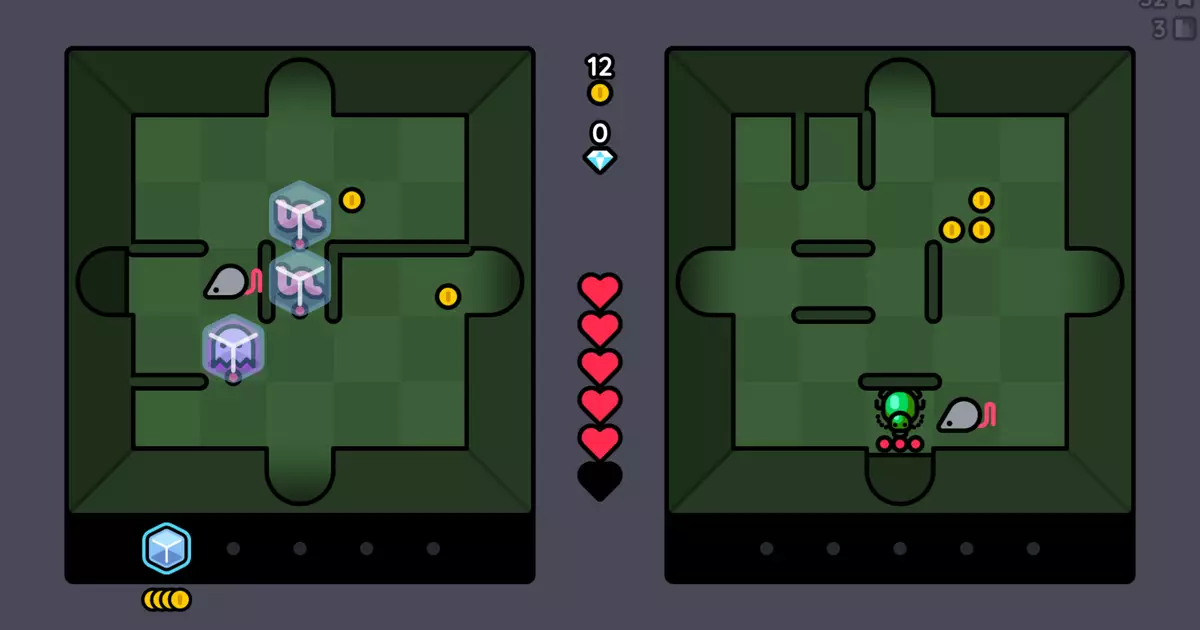In a landscape saturated with predictable puzzles and mindless click-thru distractions, *Rat King* emerges as a breath of fresh, invigorating air. This inventive turn-based puzzler dares players to think multi-dimensionally, forging an experience that is as intellectually demanding as it is deeply satisfying. Unlike conventional single-character games, *Rat King* thrusts players into control of two rodents, each navigating separate but interconnected dungeons on split-screen. This design choice isn’t just aesthetic—it fundamentally alters how players approach problem-solving, forcing them to juggle simultaneous, often conflicting objectives with precision and foresight.
The core mechanic hinges on managing these two entities, which share a common health pool yet face different layouts and enemy patterns. The challenge lies in synchronizing their movements—an act akin to conducting a complex dance on two separate stages. Because each rat’s environment varies, moments will inevitably emerge where one is in peril while the other is safe. Navigating this chaos demands a nuanced understanding of spatial relationships and timing, with the player constantly balancing risk and reward. The game becomes a mental juggling act, demanding strategic planning that accounts for unpredictable enemy spawns and room layouts.
Innovative Mechanics and Player Agency
One of *Rat King*’s most compelling qualities is its layered gameplay mechanics, which reward innovation and adaptability. Each rat can move independently across its dungeon, and their actions can lead to creative solutions—such as repositioning one rat to provide a safe passage for the other or baiting enemies into traps. The game cleverly introduces tools and items that expand strategic options, like an ice cube that immobilizes foes or control-altering artifacts that rotate input commands.
These items do more than just facilitate progress—they imbue the game with a nuanced depth that keeps players invested. The ice cube, for instance, can turn a hazardous situation into a manageable one, effectively pausing enemy threats for crucial seconds. Meanwhile, more unpredictable items like the purple swirly, which disorients control inputs, challenge players to think outside the box and embrace trial-and-error in pursuit of mastery.
Furthermore, *Rat King*’s design subtly punishes brute-force tactics. Bounce off walls repeatedly, and you risk awakening vengeful ghosts—spectral guardians that serve as a soft, thematic barrier against careless gameplay. This design decision discourages mindless button-mashing and encourages actual puzzle-solving, elevating *Rat King* beyond mere reflex-based challenge to an intellectual test — reminiscent of classic lockpicking minigames or clever hacking puzzles.
Crafting a Unique Identity in the Puzzle Landscape
What sets *Rat King* apart from its peers is how convincingly it blends tension, humor, and challenge into a cohesive package. Its aesthetics are minimal yet charming, and the split-screen mechanic offers a visual immediacy that heightens tension. The ghosts, enemies, and items meld into a tapestry that feels both playful and perilous, suggesting that beneath its cute exterior lies a serious challenge capable of consuming hours if approached with dedication.
The game is not merely a cutesy distraction but a genuine homage to the kind of cerebral gameplay that pushes players’ strategic thinking and forward planning. It echoes the DNA of influential puzzle games and hacking minigames, refining these elements into a distinctive experience. Although still in early access, *Rat King* already shows tremendous potential, hinting at a future where players will grapple with increasingly complex scenarios, requiring even more creative navigation and coordination.
Critics and casual players alike should approach *Rat King* with an open mind and a willingness to embrace failure. Its devilish design rewards perseverance and mental agility, making each incremental success feel like a small victory. As it continues evolving, this game has the makings of a timeless classic—one that challenges convention and reinvigorates what puzzle lovers expect from their gaming experiences.

